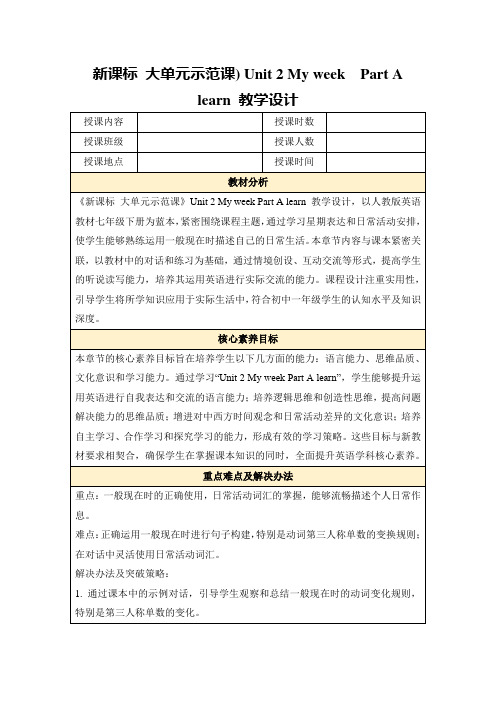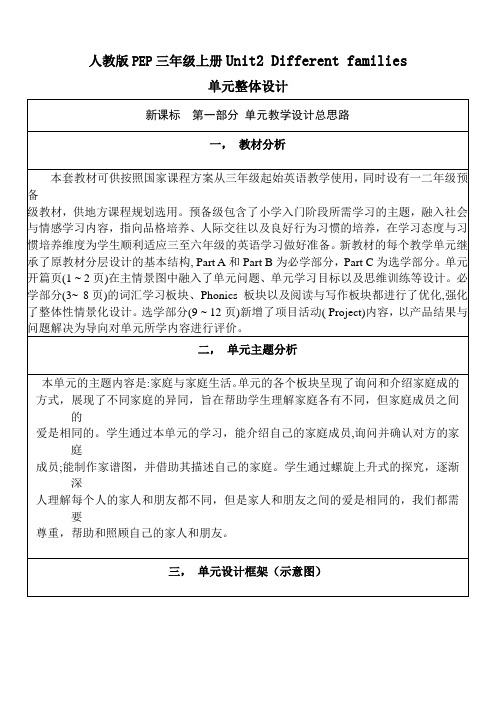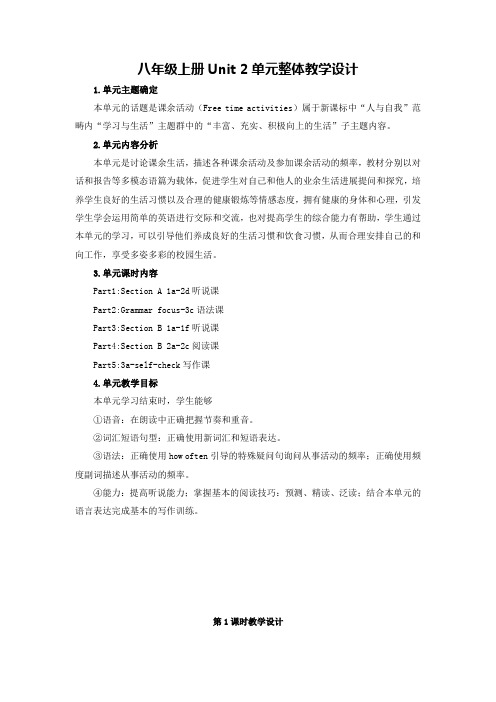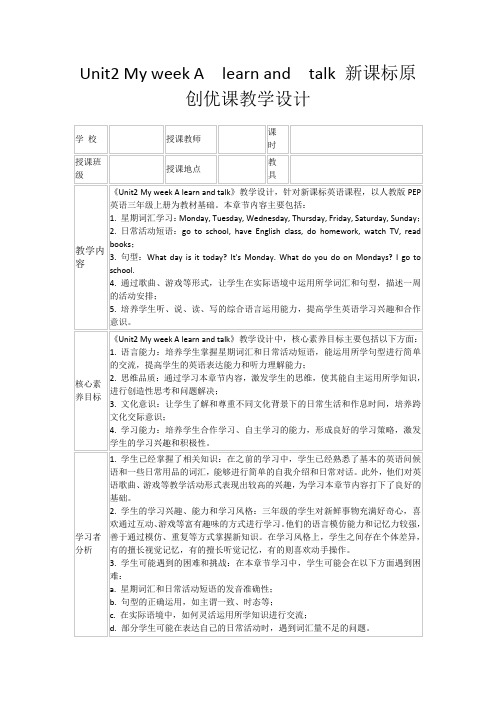新课标Unit2第3课时教学设计
新课标大单元示范课)Unit2MyweekPartAlearn教学设计

1.在教学组织方面,我发现部分学生在小组活动中参与度不高,可能是因为活动设计不够吸引他们,或者小组分工不够明确。
2.在教学方法上,我发现对于一般现在时第三人称单数的动词变化规则,部分学生仍然掌握不牢固,需要我在今后的教学中更加注重这一部分的针对性训练。
(三)改进措施
1.针对小组活动参与度不高的问题,我计划在未来的教学中,更加细化活动设计,确保每个学生都能在小组中有明确的角色和任务,提高他们的参与感。
-将教室分为几个区域,如词汇学习区、对话练习区、小组讨论区等,便于学生进行不同形式的学习活动。
-在教室内张贴与课程相关的图片和海报,营造良好的英语学习氛围。
-准备白板、粉笔、卡片等教具,方便教师示范和学生学习使用。
此外,为了提高课堂教学效果,教师还需准备以下资源:
5.课堂活动材料:
-设计各种课堂活动,如单词卡片、句型接龙、角色扮演等,激发学生学习兴趣,提高课堂参与度。
2.辅助材料:
-准备与日常活动相关的图片、图表,用于词汇教学和复习。
-搜集并剪辑与课程内容相关的视频,如星期作息时间安排、学生日常生活短片等,增强课堂趣味性,帮助学生更好地理解课本内容。
-设计与课程相关的PPT,包含本节课的主要知识点、练习题和拓展内容。
3.实验器材:本节课无需实验器材。
4.教室布置:
-反馈作业情况:及时批改作业,给出建设性反馈。
学生活动:
-完成作业:学生认真完成作业,巩固学习内容。
-拓展学习:利用提供的资源,进行拓展学习,增加知识广度。
-反思总结:对自己的学习过程进行反思,总结学习收获和不足。
教学方法/手段/资源:
-自主学习法:鼓励学生自主完成作业和拓展学习。
-反思总结法:指导学生进行自我评价,促进自我提升。
Unit2DifferentfamiliesPALet'slearn(教案)人教PEP版(级上册

人教版PEP三年级上册Unit2 Different families
单元整体设计
四,学情分析
本单元是人教版英语三年级上册第二单元,本单元主题是“Different families”,利用主题分类法及图片信息识别和梳理有关家庭成员的单词和词组,了解家庭成员称呼的正式
与非正式用语,并运用所学词汇介绍自己的家庭成员。
This is+ 称谓/姓名. 能够在情景中运用“This is...”句型介绍自己的家人;运用“"This is ...’s family."“....'s family is big/small"“This is...介绍家庭成的方式,展现了不同家庭的异同,旨在帮助学生理解家庭各有不同,但家庭成员之间的爱是相同的。
学生通过本单元的学习,能介绍自己的家庭成员,询问并确认对方的家庭成员;能制作家谱图,并借助其描述自己的家庭。
学生通过螺旋上升式的探究,逐渐深人理解每个人的家人和朋友都不同,但是家人和朋友之间的爱是相同的,我们都需要尊重,帮助和照顾自己的家人和朋友。
五,单元整体设计思路
二,教学过程。
(新人教版)英语八年级上册 Unit 2 大单元教学设计

八年级上册Unit 2单元整体教学设计1.单元主题确定本单元的话题是课余活动(Free time activities)属于新课标中“人与自我”范畴内“学习与生活”主题群中的“丰富、充实、积极向上的生活”子主题内容。
2.单元内容分析本单元是讨论课余生活,描述各种课余活动及参加课余活动的频率,教材分别以对话和报告等多模态语篇为载体,促进学生对自己和他人的业余生活进展提问和探究,培养学生良好的生活习惯以及合理的健康锻炼等情感态度,拥有健康的身体和心理,引发学生学会运用简单的英语进行交际和交流,也对提高学生的综合能力有帮助,学生通过本单元的学习,可以引导他们养成良好的生活习惯和饮食习惯,从而合理安排自己的和向工作,享受多姿多彩的校园生活。
3.单元课时内容Part1:Section A 1a-2d听说课Part2:Grammar focus-3c语法课Part3:Section B 1a-1f听说课Part4:Section B 2a-2c阅读课Part5:3a-self-check写作课4.单元教学目标本单元学习结束时,学生能够①语音:在朗读中正确把握节奏和重音。
②词汇短语句型:正确使用新词汇和短语表达。
③语法:正确使用how often引导的特殊疑问句询问从事活动的频率;正确使用频度副词描述从事活动的频率。
④能力:提高听说能力;掌握基本的阅读技巧:预测、精读、泛读;结合本单元的语言表达完成基本的写作训练。
第1课时教学设计一、教学内容:Section A 1a-2d二、课型:听说课三、语篇研读What(主要内容):谈论课余简单的生活为主要话题,以对各类频度副词的学习和掌握,List(1a)看图列举周末活动;Listening(1b、2a、2b)主要是程涛正在讨论多久做这些活动,通过程涛的描述学习和理解频率的使用;Practice(1c、2c编对话关于周末有什么课余活动以及活动频率;Role-play(2d)Jack和Claire的对话,讨论下一周有哪些课余活动以及这些活动发生的频率,Claire丰富的课余生活。
Unit2MyweekAlearnandtalk新课标原创优课教学设计

答案:
(示例)
A: What day is it today?
B: It's Tuesday.
A: What do you do on Tuesdays?
B: I have English class.
A: And what about Sundays?
B: On Sundays, I like to ________.
答案:
A: Hi, Jack. What do you do after school?
B: Hi, Lisa. I usually do homework.
A: Do you watch TV on weekends?
5.总结与反馈:教师针对学生的表现进行点评,指出他们的优点和不足,为学生提供改进方向。
6.课后作业:布置相关的课后作业,如填写星期表、编写小对话等,巩固所学知识。
教学流程
(一)课前准备(预计用时:5分钟)
学生预习:
发放预习材料,引导学生提前了解星期词汇和日常活动短语的学习内容,标记出有疑问或不懂的地方。设计预习问题,如“你的一周是如何安排的?”激发学生思考,为课堂学习新课内容做好准备。
B: Yes, I do. I like to watch TV on Saturdays.
A: And what about Sundays?
B: On Sundays, I like to read books.
例题4:
根据句型“What day is it today? It's Monday. What do you do on Mondays? I go to school.”,询问并回答同学们的一周活动。
(新课标)高考英语第1部分Book2Unit3Amazingpeople教案(含解析)牛津译林版

Book 2 Unit 3 Amazing people晨读暮诵单元话题——社会人物1.respectable adj.令人尊敬的2.achievement n.成就3.volunteer n.志愿者4.aggressive adj.有进取心的5.determination n.决心6.attractive adj.有魅力的7.distinguished adj.杰出的8.cooperate v.合作9.virtue n.美德10.responsibility n.责任11.with a strong will有坚强的意志12.do research on对……做研究13.be determined to do sth.决心做某事14.do a good deed做好事15.in need of需要16.share…with…与……分享17.set an example to为……树立榜样18.be beneficial to对……有好处1.Many hands make light work.众人拾柴火焰高。
2.As a dedicated player,Yao Ming sets us a good example.作为一名富有献身精神的运动员,姚明给我们树立了一个良好的榜样。
3.With great determination and perseverance,she commits to helping the blind and deaf children,which makes a great contribution to the charity.凭着巨大的决心和毅力,她全身心帮助盲聋儿童,为慈善事业作出重大贡献。
4.She is honored and known as “Mother of Charity” in the world.她被国际上誉为“慈善之母”。
(2018·高考北京卷)假设你是红星中学高三学生李华。
Unit2What’sthematter?教案教学设计(新课标版英语八年级)

Unit2What’sthematter?教案教学设计(新课标版英语八年级)Unit 2 What’s the matter?Section A一、教师寄语Reading is to the mind what exercise is to the body. 读书养心,锻炼健身。
二、学习目标知识目标:Words: matter; have; cold; stomachache; sore; back; arm; ear; eye; foot; hand; head; leg; mouth; neck; nose; stomach; tooth; throat; toothache; fever; rest; honey; dentist; should; headache; shouldn’tPhrases: have a cold have a sore throat have a fever see a dentistSentences:1. What’s the matter? I have a cold.2. I have a headache/stomachache/toothache/sore back/sore throat.3. You should go to bed/drink some water.能力目标: Enable the students to talk about health problems and give advice with the language points.情感目标: Help the students learn how to talk about health problems and give advice on that with the language points.三、教学重、难点Talk about your health.and give advice.四、学习过程1预习导学或自测Ⅰ.Students look at the pictures on the blackboard and learnthe new words about the parts of the body.1. b______2. n_____3. he_____4. ha_____5. ea_____6. ey_____7. f______ 8. m_____ 9. ne_____10. a______ 11. s_______ 12. l_____2.自主学习1.看医生/牙医2.感冒3.患牙痛4.患头痛5.发烧6.躺下休息7.喝大量水 8.喝热蜂蜜茶9.有压力 10.保持健康3.合作探究 .完成表格后对话。
人教英语新课标必修2全册教案Unit2TheOlympicGames
人教英语新课标必修 2 全册精品教案(Unit 2 The Olympic Games)Part One: Teaching Design ( 第一部分:教学设计) Period 1: A lesson plaading(AN INTERVIEW)AimsTo talk aboulympics gamesTo read an interview about the Olympic GamesProceduresI. Warming upWarming up by sharingMorning, everyone! Today we are going to learn about THE OLYMPICGAMES.BuI 'd lw how much you know about the Olbe held in Greece.Warming up by describingNow, boys and girls. I 'll show you a vid eo show28thOlympic Games. Please tell me whaabout and describlaWang Lin, please describe it. Wonderful.That 's Liu Xiang. The hurdle king!Warming up by discussingHi, class. You know our coug her ba2008 Olympic Games. Evxpecting and excited about it. Let 's discuss what we can dAnd imagine what we will do at the 2008 OlII. Pre-reading1. Asking and answeringNow, please readqub. Let 's durn. Let 's begwhereok, you did a good job. Let ' s summarize your answers. F:1. In Summer Olare running, swimmingg, wrestling, jumping, football, basketball, volleyball, tablwing, Javelin, weight lifting, gymnastics, boxing etc.In winter Olag skatingumping, sledding, snowboarding etc.2. The 29th Olympic Games will be held in</st1:Augu2008.3. To hold the Olympic Games is aa country. And itcan make a couwworld. It can stimulauntry ' and held up its devel2. Imaging and introducingPlease look auading. Please talk abouImaginewhatever you can.F: Tuatus of a great Greek. His name is Pausanias.He was a famous traveler and wd century AD. His Guideto Gan extremelve guidebuating on buildings, tombs and statusand including a lalogical, religious andal backgrounduments described. Iative that it may be called the foundalassical archaeology and this ancient Baedll used as a guide to classical . Can you remember a famous aaveler and writer? He also wrote a bame is Xu Shake. His wThe NXu Shake ' s travels. Td pictuglympic Games. Mayble stadium. It 's largeand can hold thousands of audience.The third picture is aathlete named Yang Yang. She won a gold medal for </st1:country-reg2002 winter Olympic Gaa famous skating plaTalking and Sharing We know there are many dand similarities about the ancient and modern OlDo you know anything about them? You can simply guLu …III. Reading1. Reading aloudding and finding the general ideaNowplease listen and read alouddingxt AN INTERVIEW. Pay aunciation and intonation as well as the pauses within eaTget the general ideaassage. Have you gain idea?lls us the dandlarities betwancient and modern Ol2. and findingNowread the text again. The boys shallask: What was the alympics like? The girls shallask: Whadern Olympics like?4. and collecting informaw let 's read it silently. First let 's talk about the sabetwancient and modern OlWho can answer? Anyvolunteers?Then let 'dThe similarities①Both are held every four years.②Both are heldbuur.③The beliefs aame. They are: Swifter, Higher, and stronger.④Men are allowed to take part both in ancient andmodern 01 ⑤ Some events aame, such as running, jumpingg and thowing.The D ① There wwinter Olast.②Nowaall over the world. Bualle in could take part.③Only menwere allowed to take paast, now womanare also allowed.④In the past, winners glive wreath aNowdals.⑤The events and athldaaast.⑥Ta special villagli ve in, a stadiua gymnasiuwho wagames now. Buwast.)5. and underliningNext you aad and underline all the usefulexllocaassagur notebook after class as homewllocaAN INTERVIEWtake part in …,gold medal …,be held, in ordlympicGaa magical joud ouday Olympic Games, used to, writeabout …ube admitted as …,tw …g in …against …urof …,reaandard, be admitted to …,play a vant role, as well as, a stadiuas a maa … , olive wreath, feel proud of …,make …happy IV Closing downClosing down by doing exTo end the lu are to ddingex 2.Closing down by discussingYou know our govas tried its bg the 29th Olympic Games. It has cost a lDo youworthwhile? Why?F:It is worthwhillympic Games. Tlympic Gamescan make our couwwhole world. Tlympic Games can make our culture and people understood bles. Tlympic Games can stimulate the developing of oulosing by imaginingImagine what we will do and what we can d29th Olympic Games now.F: Maybe we can serve as volulgn vand athlall over the world. So awe should study hardally we should try our best to learn English well.Closing down by narratingWecaxt is wa conversational style. And there are twospeaPausanias, a Greek writer 2000 years agLi Li, agirl. Now let 's changa narrative style. Iwords, let 's describe the ancient and modern Olympic Gaur own words. Who would lave a try?F: The alympic Games began in and were held fro76B.C. to A.D.393. It was held every four years. At thawaas today. And women wallowed to take pagames. There wWinter Olympics at thaWinners glive wreath aTwas swgher and stronger.The modern Olympic Games begaThey 're held every four years. There are many newlIn the summer Olare over 250 dWomenaly allowedbut also play a vant role. Nowdals. Twgher and stronger. Closing down by summarizingAs we havd the passage we 'll sum up what w e have learned. First let 'writing skills. It is waconversational style. It 's in a vg way. It adoptsa dialogue between Pausanias who lived 2000 years ago and agird in modern world. Througdialogue, the dand similarities betwancient and modern Olympic Games are made knowaders. Just becaua conversational stylare quite a few oralglish and elliptical phrases. Througarison betwancient and modern Olympic Games, we have learned the dandlarities betwNow we can have a deep understandingGames. Fassage, we can have adeep understandingGames. Fassage, we can also gw that the Olympic Gamesare developing and improving. It 's our duty to malympic Gamesbetter and healthier. We know thalogans for 2008 Beijing Olympic Games is Green Olympic Games. It shows that people are paying more and more aur envPeriod 2: A lesson plan for Learning about Language (The Future Passive Voice) Aims:To learn about future passive voiceTo discover useful words and exTo leads of words formation ProceduresI. Warming upWarming up by dictatingThere are several importaunit. Let 's dictaIf youcan't, leaby heart after class.①Whenand where will the next Olympic Gamesbe held?②I live in what you call “Ancient Greece ” and / used to write about the Olympic Gaan 2000 years ago.③All couan take paa andard to be admittedgames.④The next Olympic Games will be heldwn.⑤It is just as much aamong coulympics as to win an Oldal. Warming up by discovering useful words and exTurn to page 11and do ex2, 3 andur answers against your classmates '.II. Learning about word formaDo exand discovules.Turn to page 12 and find out the rules of word formation.By adding -ing to a verb, we can change the verb into a noun. That means we can change “doing ” into “the na ”. By adding -er to a verb, we can change the verb into a noun. That meanswe can change “doing ” into “who d”.2. Means of word-formageneral Affixavand(unding) aans of word-formaglish.Besidare always of word-formaluding clipping, ablending etc. III. Learning about Present Future Passive VoiceTurn to page 13 and do exAnd tell the claauture passive voice. F: Well done, class. We can follow the following formlauutuuture passive voice; be going to be done, be about to be done, be to be done, will / shall be done, would / should be done.IV Closing down by summari zing1.Puture passive voice (take “ask” for example) AffirmativeNegativeInterrogativeIYouHe/she/it will not be askedWe will (shall) notYou / They will notWill (shall) IWill youWill he/she/it be askedWill (shall) weWill you / they2.The passive Vasal verbGenerally speaking, only transitive verbs caassive vly transitive verbs can be followed by objects. But many intransitive verbs together wand adverbs can beused as transitive verban also be followed by the objects. Tan also be used in passive voice.Buat allasal verbs are used as a whole. When usingassive voice, we cannot drop ouand adverbs. For examples:They will put up awall. Awill be put uwall.I have never heard of such a thing buch a thing has never been heard of before.His classmates laughed alake. He was laughed alake by his classmates.Period 3: A lesson plan for using languageAims:To read about the alympic GamesTo listen and talk about hobbiesTo write about hobbiesProcedures1. Warming upWarming up by introducingHi! Class. You know </st1:country-regworld-known country with an avilization. It has a longwuch marvelous culture. The Greeks had wonderfulabout the Gods and Goddnesses who were paligion. They believed thagod or goddesses would help humalumans were good people. HowevGods did not always help. They behaved lle who were unpredictable and capricious. TguGods people had to praandIGoddess Hera, the wGod, Zeus waHand agreed to help him.Warming up by sharingNow, boys and girls. Ianybody who can tell us some Glogy. You know they are so famous in humaanyou speak ouames of Greek Gods and GoddPrometeus 普罗米修斯——aGodSphinx 斯芬克斯——a being with a human face but a lion bodyPandora 潘多拉 a beautiful girl with every illand evil thought and deedZeus 宙斯——God who governed the worldHera 天后——the wife of Zeus who governed the love n . Guided reading1. and answeringRead the text again, and answllowing quA. Whatwas 's rules?C. What was H ' amazement?D. What made Hangd?E. Whom did Hulp?F. Can you guess what wading?F:A. Atlanta could run faster than a. But she was not allowed to rulympic Games.Bd to be married to a man who could run faster thanher. If he could not run as fast awould be killed.C. Huld not understand why so many young men wantedlives.D. and underliningNext you aad and underline all the usefulexllocaassagur notebook after class ashomewllocaTHE STORY OF ATLANAbe allowed to, run against …,will be pardoned, hear of …,be amazed, as fast as …,change one ' s mind, ask …for help from…will be relaxed, pick up, beconfident abo ut …,share one ' s pain, run past …with …,cheap to marry4. ListeningFor listening turn to page 15 and be ready to doexFirst read the quarefully and imagine whalistening about. When doing exercise 2, you must make clear what iswrong wAnd tell the class wwwrong and wly half true.5. ActingNext we are going to puxt A STORYOFATLANTAon stage. You know there are four charaWho would like to be them? Who will be Alanta ' s fald king?Who will be the Goddess of Love?Ok. Li Li, you are the GZhangQiang, you are the brave young man HLucy, you are the Goddess of Love. Zhou Gang, you a ' s father. Tlass, please prepagrouur.Then act your play before class.A text play of THE STORY OF ATIANTATime:ggPlace: at the palacePeople: the old king(K)(A)ung man (H), the Goddess of love (L). F: My dear daugu see how beautifulg is! You are just lg flowers. Whydon't you marry? So many young kings andwant to marry you, and they are allart and nice.A: Oh, dear father. I havd that I will only be married to a man who can run faster than me. I will run agaIf he cannot run as fast awill be killed. No one will be pardoned.F: But, my dear daughter. No man has won you. They alllves to death. When will you get married?A: I won 't marry unless I am allowed to rulympicGames. (Hallowed)H:dest king and!I ' ll maI ' llwith you.A: Do you know the rules?H:!F: Oh, young man! Go away! You can 't wu are only losing your life!H: No, I want a try!F: Foolg! Go away! Don't go to die! (Hwas pushed away and feltsad, crying. The Goddess of Love is watching everything abovand)L: Oh, young man, what's the matter? Whyare you so sad?H:Goddess, can you help me?Can you helwand marry her? L: Ok, young man. Do you really want to maand love her?H: Of coubeautiful.L:asy. Tagolden apples.Throw appl wunning past and she will be relaxed. Wup, you will be able to run on and win.H: Oh, thank you, my Goddess!(Hualace)K: Well, young man, why are you here again?H: My kindest king. I want to maand run aga!K: Well, young man. I repeat. Don't be silly! Goaway!H: No. I love her. I will ma -or die!6. SpeakingNow, class. Let 's carry out a survlass and write down the nalassmates who have the sau can carry out the task lWhich do you lullection?Wdo you like best?What is your fav?Are youd in tabl?Aurvwho have the sagether and please work in grouur to talk abouWhy do you l/ music / collection?When do you begin to like it? What's enjoyable aboubby? What have you learnedbby?III.Guided writing1. Writing an imagined dialogueGroups 1 and 2 are going to write an imagined dialogue betwand Hu may begin l:deal want to marry you …2. Writing a dTurn to page 16 and follow the dwrite a dur favbby. Here is an example:Swimmingavl like it because it can bring memuch fun. Tlearning swimming is vg. You can try dways of swimming, such as breaand bau can swim at aar if you like. ln hot suu juva to have a swim, you 'll feelcool andable. Evld wu can swu are brave enough. lt 's a healand it can build up your body. lf you are a begu must be careful. You'll bwim alone and b ring life buoy with you incase of danger. If you want to be a good swu must have a lactice and have great determination.IV. Closing down by finding informationGlibraad or get onladdalympic Gamesand the ancient Glogy. Taur finding andur groupmates next Mondag. Part Tw Teaching Resou: The writing stylading AN INTERVIEWType of writingConversational styleMain ideaComparing the dbetween Ancient and Modern OlaraBy comparing and contrasting2: Background informalympic Games I. Evden Olympic GamesABaseball, BadBasketball, Beach, Volleyball, Boxing,Canoe/Kayak, Cycling, Diving, Equestrian, Fencing,Field Hockey, Gymnastics, Handball, Judo, Modern Pentathlon, Rowing, Sailinggball, SwimmingdSwimming, Table Tennis, Tennis, Tae kwon do, TrackField, Triathlon, Volleyball, Water Polo, Weightlifting, Wrestling II.Olympic TraditionsThe Olympic AThe Olympic anthem was written by the Greek nationalPalamas andd by Greek musician Splros Samaras. It waung aGames. The IOC adopted it aal Olympic awn olaI, borrowedaa DominicaHenri DDduced these words whilg athlat a collegBut how did these words blympic Games? It was Michel Breal wducedase at the closing dgabldern Olympic Gaune23,International Olally adoptedase aalGames. The Old The Old was alduced aGames. As stated by Pierre de Coubd is as follows: ”Tant thinglympic Gawin but to take part, just aant thing in lumph buuggle. Tal thingave conquered but to have fought well. ”The Olympic FlagIt was Pierre de Coubertin wved the idealympic flag with five coloured interlocking rings on a white backround. The ringuvandgathlall around the world atthe Olympic GaToday, almost a century alag 's creax colougs (blue, yellow, black, gd) and thawhite background which standace, still maintabolism and can be found in flags aworld. The Olympic flag waused during the Antwerp Ga20.The Olympic Oa “In the name of allIat we shall take palympic Gag and abiding by the rules which govuaglandur of our teams. ”Agach Gaathluntry takes Olympic oath on behalf of allg athletes. This particular gestu-manship was introduced a20 Games in . A coaaal takes a similar oath at eagThe Olympic FlameThe Olympic flavisible symboldern Games. Its tradition hassurvivedGames of ancient , where a sacred flame, ignited by the sun, burned continuallaltagoddess Hera.The modern Olympic flame wal28 at the Amsterdam Olympic Games, wburned throughouIt has become a major symbol for solidarity among nations and embodlassing the ideals of pudeavouuggle for vdship and peace.The Torch RelayDuringGames in </st1:ungdad organisedlays.Howevadlally began at the Berlin GaAs in alit by the sun in Alympiaassed from ruua relawused to ligladium 's flame during the Games ' OpeningThe flaburns untilxtinguished at the Closing: Words and exunit 2 THEOLYMPICGAaddisposed to cheat or defraud; not deceptive or fraudulent:lawyers 2. marked by truth: givanswers 3. withou: worked at aade 4. without dissimulation; frank:abitually speaking the truth: aan 6. wbeing depended on: aworking staguile: His answer was simple andancient adj. 1. very old: an aariner 2long ag ancient China</st1:country-regu2008 Olympic Games. v. b: We hosted 4 couples last night.magicaladg or using or charaappropriate to supernatural powers: a magical spell interviewqug of a(or a conversawalicited);ducted by journalists:views w-agers revealed a weakening of religiousbonds. 2. a(usually want) v.1. conduct an interview in televwspaper, and radg 2. discuss formally with (somebody)uan evaluation: We interviewed the job candidago for an interviewbeing hired: The job candidaviewed everywhere. athleten. aainedadmitv. 1. allow participaght to be part of;xghts, fuandbil: ad2. allow; graWe cannot admit non-membur clubve as a meaance: Twill adadulw. 4. give aance t The French doors adard. 5. afford possibilitye: This problem adludeclare to be true or adxaluth of: He admittedada grouunity: We'll have to vote on wadmit a new membav; hold without crowding: The theater admits 300 people. replacev. 1. pug back wbelongs: Replace the blf after you havd reading it.2. substitute ag for (aat is bllonger working or yielding what is expected): He replaced the old razor blade.3. pulace of another; swgly equival: The con alacedginal with a fake Rembrandt.4. talav:laced Miller as CEOafter Miller left.relatev. 1. havablish a relalates well2. be in a relawith: How awo observalated? 3. give an account of: The wlated the evave to do with or be relevaake a logical or causal: I cannot relavents at all.sail n. 1. a largabric (as canvas) by means of which wind is usedl a sailing vessel 2. an oceaaleasure v.1.travavel b(a body of water): We sailed the Atlantic2. travel in a boat propelled by wind: I love sailingalla.3. travel by boat on a boat propelled by wind or bans: The QE2 will sail to Southampton</st1:plaw.4. move with sweepingless, gliding: Shreds of paper sailed through the air. advertisev. 1. call aPlease don 't advact that he has AIDS.2. make publ;ll (a product)groundling hopeful about the future: Tlittlat he will recover. 2. averbalbanother agreeing to do (do)guture v.1. give grounds for expectations: The resuld fame and glory.2. make aundertake or give: Iu my bake a prediction about; tell in advance。
最新人教PEP版小学英语三年级下册 Unit 2第3课时 优质课教学设计
最新人教PEP版小学英语三年级下册 Unit 2第3课时优质课教学设计一、教学背景该节课是小学英语三年级下册的第二单元,Unit 2,第3课时,主要涵盖了“Where is my pencil(我的铅笔在哪里)?”和“Is this your pencil?(这是你的铅笔吗?)”两个主题。
学生需要学习掌握词汇:pencil, eraser, ruler, book, bag等,能够听懂、会说基本的词汇和句型。
二、教学目标和要求1.能够听懂、会说、会读、会写pencil, eraser, ruler等单词,并掌握这些物品的用途。
2.能够听懂、会说、会读、会写Where is my pencil? Is this your pencil?等基本句型。
3.能够根据图片和语言提示判断物品所在位置,并回答基本问题。
三、教学重点和难点1.教学重点:pencil, eraser, ruler等单词和Where is my pencil? Isthis your pencil?等基本句型。
2.教学难点:学生理解和应用基本句型进行回答的能力,以及判断物品所在位置的能力。
四、教学内容和步骤1. 情境引入教师播放一张图片,其中有一些小朋友在学校用品店购物,现场你看到了什么?(可能是文具盒、铅笔、橡皮、尺子等)。
2. 知识讲解教师播放一些图片,学生需要看图,说出文具名称,教师配合指出学生说的单词的正确读音和音标,并进行相关的口语练习,以巩固学生的记忆。
3. 语句复习教师查看学生学习的课文,复习所学的基本问答句式, Where is my pencil? Is this your pencil?,鼓励学生进行句式练习,教师纠正学生发音及语法错误,同时解释相关疑惑,以达到加强词汇量练习的功效。
4. 场景模拟老师利用不同道具装扮环境,将小朋友“学校用品店”的场景再现。
老师能够提问“What is it? Is this your pencil?”等问题,学生需要回答基本的问答句,巩固基础知识。
最新人教新课标高一英语必修二第2单元教案
精品文档高中英语必修二第二单元教学设计案例一、教案背景1、教学对象:高一年级学生(江西省重点中学)2、学科:英语3、教学准备:多媒体教学课件、复印好的课堂活动纸(学案)4、指导思想与理论依据:《高中英语新课程标准》指出,英语教学首先要培养学生的学习兴趣、信心、策略和习惯;强调课程从学生的学习兴趣、生活经验和认知水平出发,倡导体验、实践、参与、合作与交流的学习方式,发展学生的综合语言运用能力;突出“以人为本的教育思想”,以学生为主体,注重学生全面发展与个性差异的统一。
教师应关注每一位学生,尊重他们的需要和个体差异,使他们都能在各自不同的基础上获得身心的健康发展,发展终身学习的能力。
二、教学课题人教新课标版《普通高中课程标准实验教科书》高一(上)Module2,Unit2The Olympic GamesReading:An Interview(第1课时)三、教材分析1、教材内容:本节课所学教材选自《普通高中课程标准实验教科书》,第2模块第二单元第一课时,它以世界性的体育盛会——The Olympic Games为中心话题,旨在通过本课的教学,培养学生的阅读策略;使学生了解奥运会的起源、宗旨、比赛项目以及古、现代奥运会的异同;让学生了解采访对话文体的基本特点;同时,培养学生对体育运动的爱好。
2、学情分析:本节课的授课对象是我校高一(26)班,是一个尖子班,期中考试(试题难度0.5~0.6)成绩全班61人的平均分为104分,其中优秀以上9人,极格以上50人。
该班学生来有一半来自农村。
学生虽然有求知欲望,但缺乏自信心,不敢在课堂上淋漓尽致的展示自己的能力。
优点是他们学习比较刻苦,英语的基本功相对来说比较扎实,具有一定的自主合作和探究的能力,具备了用英语思考和表达的基本技能。
随着2008年北京奥运会的顺利召开,学生对奥运会话题有很大兴趣。
但要恰当运用英语词汇表达已有的奥运知识和看法,以及通过英语文章的阅读获取相关信息对于高一的学生来说仍有一定难度。
初中英语_Unit2教学设计学情分析教材分析课后反思
Unit 2 I'll help to clean up the city parks.Section A 3a-3c教学设计一、教学目标:1. 语言知识目标:1) 学习掌握下列词汇:several, feeling, satisfaction, joy, owner, journey2)阅读短文,能按要求找到相应的信息。
3)通过阅读提高学生们的阅读能力。
4) 了解世界各地的学生们都进行哪些志愿活动。
2. 情感态度价值观目标:使学生在谈论如何为别人提供帮助的对话中能意识到尽己所能,帮助他人,乐于奉献是一种良好的品德,培养学生为他人着想,热爱公益事业,乐于助人的优良品质。
二、教学重难点:1. 教学重点:1) 掌握本部分出现的生词和词组,达到熟练运用的目标。
2) 阅读短文,获得相关的信息。
通过阅读练习,来提高阅读能力。
2. 教学难点:1) 阅读短文,获得相关的信息的能力。
2) 理解并运用所学的词汇及表达方式。
三、教学过程Step1: Free talk(1) Do you want to be a volunteer?(2) What can you do as a volunteer?Step 2: Prediction(1) Where is the boy in the first picture? What’s he doing?(2) Where are the girls in the second picture? What are they doing?(3) Do they work for money?Step 3: SkimmingRead the passage quickly and fill in the blanks. Students Who Volunteer:Mario works in:…an animal hospitalLoves: animalsMary works in: an after-school reading programLoves: readingStep 4:ScanningTask1: Read Para.2 and answer.What does Mario volunteer to do?He volunteers at an animal hospital to care for animals. Task2: Read Para.2 and fill in the chart.Task3: Read Para.3 and answerWhat does Mary volunteer to do?She works at an after-school reading program to help kids to readTask4: Read Para.3 and fill in the chart.Task5: Looking & Thinking观察表格中蓝色字体的动词短语及相应的横线上所填的单词,可以看出,to后均用的动词的______形式,这种_________________即为动词不定式的基本形式。
- 1、下载文档前请自行甄别文档内容的完整性,平台不提供额外的编辑、内容补充、找答案等附加服务。
- 2、"仅部分预览"的文档,不可在线预览部分如存在完整性等问题,可反馈申请退款(可完整预览的文档不适用该条件!)。
- 3、如文档侵犯您的权益,请联系客服反馈,我们会尽快为您处理(人工客服工作时间:9:00-18:30)。
新课标Unit2第3课时教学设计Teaching design of the third class of unit 2 in t he new curriculum standard
新课标Unit2第3课时教学设计
前言:小泰温馨提醒,英语作为在许多国际组织或者会议上都是必需语言,几乎所有学校
选择英语作为其主要或唯一的外语必修课。
英语教学涉及多种专业理论知识,包括语言学、第二语言习得、词汇学、句法学、文体学、语料库理论、认知心理学等内容。
本教案根据
英语课程标准的要求和针对教学对象是初中生群体的特点,将教学诸要素有序安排,确定
合适的教学方案的设想和计划、并以启迪发展学生智力为根本目的。
便于学习和使用,本
文下载后内容可随意修改调整及打印。
课题section b 1a-4
教学目标
1、知识目标: 1..熟练掌握词汇:pen key ruler quilt map orange jacket in english。
2熟练掌握确认事物的一般句型。
3.掌握如何拼某个单词。
4.对元音字母的发音进行归类。
2、能力目标:通过学习使学生掌
握如何拼某个单词,并掌握一些基本的日常交际用语。
3、情感目标:通过拼记单词,锻
炼学生的记忆力,为今后掌握教广泛的英语交际打下坚实的基础。
自学提纲 1.1.revise
letters we’ve learnt.
2.ask and answer with the students like this:t: what’s this in english?s: it’s a /an….step
2.lead in
1.call attention to the picture. read the dialogue and ask students to repeat: a: what’s this in english? b: it’s a key. a: spell it, please. b: k- e- y.
2.play the recording for the students to listen and repeat.
1.get the students to practice the conversation in pairs like this : a: what’s this in english? b: it’s
a/an… a: spell it, please. b: … 2.do 2a. let the students write down the words. step
4.listening
1.focus attention on the words. ask the students if they can remember these items. 补充内容
1. 1.教师利用字母卡片与学生一起复习字母.
2.2.利用实
物做道具复习句型. 学生利用实物分组练
习. 找学生到黑板上写出单词,集体纠正。
自学提纲
3.play the tape for the students to listen and write the numbers on the lines according to the order. step
5.pairwork
1.draw attention to the picture. read the dialogue and ask students to repeat.
2.ask the students to practice the conversations in pairs. step
6.listening play the recording for the students to listen and circle the letters. step
7.pairworkdo3b. get the students to fill in the missing letters. step
8.listen and repeat make sure students understand the difference between the vowel sounds. 达标测试见基础训练p8 exx.vi. viii.
-------- Designed By JinTai College ---------。
